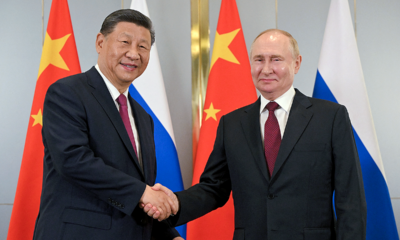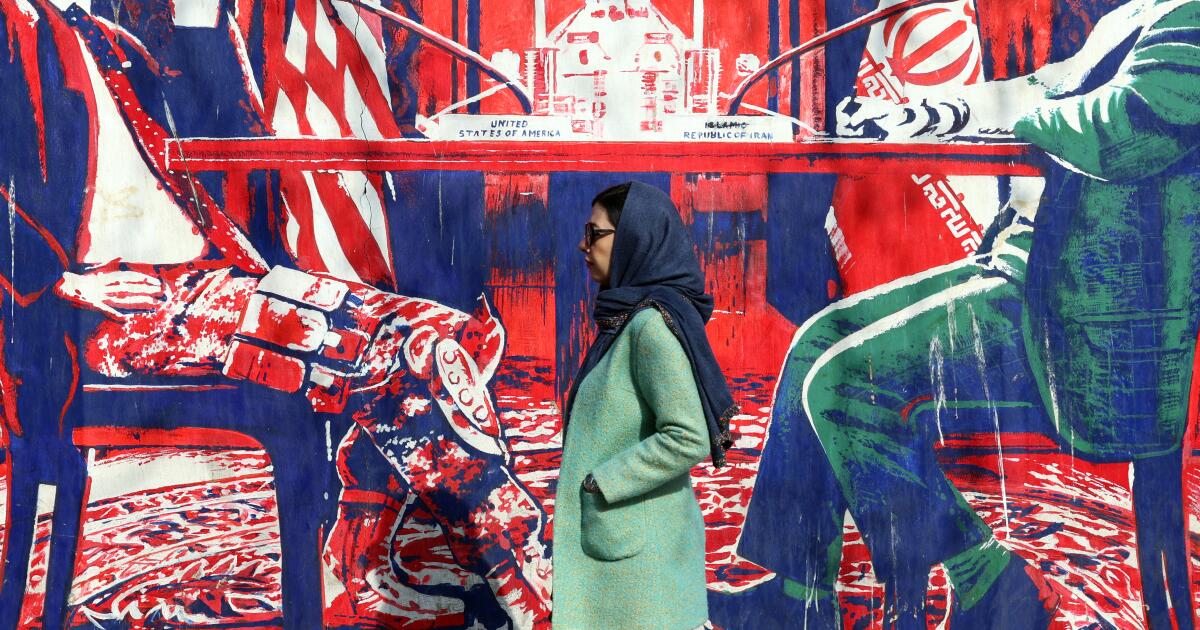World
State of the Union: Defence strategy as EU election campaigning begins

Defence policy is gaining increasing prominence in the European Union, with Brussels putting forward concrete proposals.
Defence, security, autonomy. This vocabulary has become almost a mantra in the speeches of European Union (EU) leaders since Russia’s full-scale invasion of Ukraine in 2022, and this week the European Commission finally announced the first-ever defence industrial strategy.
Although it expands existing initiatives to jointly produce ammunition and acquire weapons, it will not create the €100 billion fund previously promised.
But it is a first step that can no longer be postponed, said EU diplomacy chief Josep Borrell: “Unfortunately, peace is no longer a given. War is on our borders and Russia’s war of aggression has brought a great sense of urgency to strengthen our industrial defence capabilities.”
EPP, S&D hold their pre-election congresses
One of the people most likely to keep talking about this is the President of the European Commission, who will put defence at the top of her message in the run-up to the elections. Ursula von der Leyen was this week chosen by the European People’s Party as its lead candidate at a party congress in Bucharest.
One of her opponents is one of her subordinates, the Commissioner for Employment and Social Rights, Nicolas Schmit. He was chosen at a congress of the Party of European Socialists in Rome a few days earlier.
Climate change, economic inclusion and the fight against populism feature prominently in both manifestos.
To discuss the strategies of the two main parties in the run-up to the June elections, Euronews spoke to Teona Lavrelashvili, an analyst at KU Leuven, in an interview conducted by Sándor Zsiros.
“It’s not that they should give a simple solution to complex problems, but at least listen in such a way that voters and the electorate feel that their concerns are being taken into account. And those concerns are growing,” she said.
“We’re talking about the rising cost of living, migration, which is also becoming a problem in almost all EU member states. The problems are there, but I have my doubts about the extent to which a very concrete communication strategy will be adopted in this regard,” she added.

World
Israel strikes two schools in Iran, killing more than 50 people

State media says Israeli attack on girls’ school in the city of Minab in the south of the country kills dozens.
Published On 28 Feb 2026
An Israeli strike has hit an elementary girls’ school in Minab, a city in the Hormozgan province of southern Iran, killing at least 53 people, according to state media, as the immediate civilian cost from Israel and the United States’ huge bombardment of Iran comes into sharper focus.
Workers are continuing to clear wreckage from the site, where 63 others have been injured on Saturday, said Iran’s state-run IRNA news agency. The strike is part of a wave of joint US-Israeli military attacks across Iran that has triggered an outbreak of regional violence.
Recommended Stories
list of 4 itemsend of list
Iranian Foreign Minister Abbas Araghchi shared a photo of the attack, which he said destroyed the girls’ school and killed “innocent children”.
“These crimes against the Iranian People will not go unanswered,” Araghchi wrote in a post on X.
Iran’s Foreign Ministry spokesman Esmail Baqaei also slammed the “blatant crime” and urged action from the United Nations Security Council.
Separately, Iran’s Mehr news agency reported that at least two students were killed by another Israeli attack that hit a school east of the capital, Tehran.
Reporting from Tehran, Al Jazeera’s Mohammed Vall said the attacks call into question US and Israeli claims that “they are targeting only military targets and they are trying to punish the regime, not the people of Iran.”
“President Trump has promised the Iranian people that aid or help is coming their way, but now we are seeing civilian casualties; that’s something that the Iranian government will stress as a case of violation of international law and an aggression against the Iranian people, ” said Vall.
There was no immediate reaction from the US or Israel on Iran’s claims about the school strikes.
The last time the US and Iran waged attacks on Iran in June 2025, sparking the 12-day war, the civilian toll in Iran was also heavy.
According to Iran’s Ministry of Health and Medical Education, thousands of civilians were killed or injured, and public infrastructure was damaged, during that conflict.
World
Trump says he is directing federal agencies to cease use of Anthropic technology

World
UN Human Rights Council chief cuts off speaker criticizing US-sanctioned official

NEWYou can now listen to Fox News articles!
The United Nations Human Rights Council (UNHRC) abruptly cut off a video statement after the speaker began criticizing several United Nations officials, including one who has been sanctioned by the Trump administration. The video message was being played during a U.N. session in Geneva, Switzerland, Friday morning.
Anne Bayefsky, director of the Touro Institute on Human Rights and the and president of Human Rights, called out several U.N. officials in her message, including U.N. High Commissioner for Human Rights Volker Türk and special rapporteur Francesca Albanese, who is the subject of U.S. sanctions.
Secretary of State Marco Rubio announced sanctions against Albanese July 9, 2025, saying that she “has spewed unabashed antisemitism, expressed support for terrorism and open contempt for the United States, Israel and the West.”
“That bias has been apparent across the span of her career, including recommending that the ICC, without a legitimate basis, issue arrest warrants targeting Israeli Prime Minister Benjamin Netanyahu and former Defense Minister Yoav Gallant,” Rubio added.
Secretary of State Marco Rubio and Francesca Albanese (Getty Images)
“I was the only American U.N.-accredited NGO with a speaking slot, and I wasn’t allowed even to conclude my 90 seconds of allotted time. Free speech is non-existent at the U.N. so-called ‘Human Rights Council,’” Bayefsky told Fox News Digital.
Bayefsky noted the irony of the council cutting off her video in a proceeding that was said to be an “interactive dialogue,” an event during which experts are allowed to speak to the council about human rights issues.
“I was cut off after naming Francesca Albanese, Navi Pillay and Chris Sidoti for covering up Palestinian use of rape as a weapon of war and trafficking in blatant antisemitism. I named the prosecutor of the International Criminal Court, Karim Khan, who is facing disturbing sexual assault allegations but still unaccountable almost two years later. Those are the people and the facts that the United Nations wants to protect and hide,” Bayefsky told Fox News Digital.
“It is an outrage that I am silenced and singled out for criticism on the basis of naming names.”
Bayefsky’s statement was cut off as she accused Albanese and Navi Pillay, the former chair of the U.N. Independent International Commission of Inquiry on the Occupied Palestinian Territory; and Chris Sidoti, a commissioner of the U.N. Independent International Commission of Inquiry on the Occupied Palestinian Territory. She also slammed Khan, who has faced rape allegations. Khan has denied the sexual misconduct allegations against him.
Had her video message been played in full, Bayefsky would have gone on to criticize Türk’s recent report for not demanding accountability for the “Palestinian policy to pay to kill Jews, including Hamas terror boss Yahya Sinwar who got half a million dollars in blood money.”
When the video was cut short, Human Rights Council President Ambassador Sidharto Reza Suryodipuro characterized Bayefsky’s remarks as “derogatory, insulting and inflammatory” and said that they were “not acceptable.”
“The language used by the speaker cannot be allowed as it has exceeded the limits of tolerance and respect within the framework of the council which we all in this room hold to,” Suryodipuro said.
The Human Rights Council at the United Nations in Geneva, Switzerland, Feb. 26, 2025. (Denis Balibouse/Reuters)
MELANIA TRUMP TO TAKE THE GAVEL AT UN SECURITY COUNCIL IN HISTORIC FIRST
In response to Fox News Digital’s request for comment, Human Rights Council Media Officer Pascal Sim said the council has had long-established rules on what it considers to be acceptable language.
“Rulings regarding the form and language of interventions in the Human Rights Council are established practices that have been in place throughout the existence of the council and used by all council presidents when it comes to ensuring respect, tolerance and dignity inherent to the discussion of human rights issues,” Sim told Fox News Digital.
When asked if the video had been reviewed ahead of time, Sim said it was assessed for length and audio quality to allow for interpretation, but that the speakers are ultimately “responsible for the content of their statement.”
“The video statement by the NGO ‘Touro Law Center, The Institute on Human Rights and The Holocaust’ was interrupted when it was deemed that the language exceeded the limits of tolerance and respect within the framework of the council and could not be tolerated,” Sim said.
“As the presiding officer explained at the time, all speakers are to remain within the appropriate framework and terminology used in the council’s work, which is well known by speakers who routinely participate in council proceedings. Following that ruling, none of the member states of the council have objected to it.”
Flag alley at the United Nations’ European headquarters during the Human Rights Council in Geneva, Switzerland, Sept. 11, 2023. (Denis Balibouse/File Photo/Reuters)
UNRWA OFFICIALS LOBBY CONGRESSIONAL STAFFERS AGAINST TRUMP TERRORIST DESIGNATION THREAT
While Bayefsky’s statement was cut off, other statements accusing Israel of genocide and ethnic cleansing were allowed to be played and read in full.
This is not the first time that Bayefsky was interrupted. Exactly one year ago, on Feb. 27, 2025, her video was cut off when she mentioned the fate of Ariel and Kfir Bibas. Jürg Lauber, president of the U.N. Human Rights Council at the time, stopped the video and declared that Bayefsky had used inappropriate language.
Bayefsky began the speech by saying, “The world now knows Palestinian savages murdered 9-month-old baby Kfir,” and she ws almost immediately cut off by Lauber.
CLICK HERE TO DOWNLOAD THE FOX NEWS APP
“Sorry, I have to interrupt,” Lauber abruptly said as the video of Bayefsky was paused. Lauber briefly objected to the “language” used in the video, but then allowed it to continue. After a few more seconds, the video was shut off entirely.
Lauber reiterated that “the language that’s used by the speaker cannot be tolerated,” adding that it “exceeds clearly the limits of tolerance and respect.”
Last year, when the previous incident occurred, Bayefsky said she believed the whole thing was “stage-managed,” as the council had advanced access to her video and a transcript and knew what she would say.
-

 World2 days ago
World2 days agoExclusive: DeepSeek withholds latest AI model from US chipmakers including Nvidia, sources say
-

 Massachusetts3 days ago
Massachusetts3 days agoMother and daughter injured in Taunton house explosion
-

 Montana1 week ago
Montana1 week ago2026 MHSA Montana Wrestling State Championship Brackets And Results – FloWrestling
-

 Louisiana5 days ago
Louisiana5 days agoWildfire near Gum Swamp Road in Livingston Parish now under control; more than 200 acres burned
-

 Denver, CO3 days ago
Denver, CO3 days ago10 acres charred, 5 injured in Thornton grass fire, evacuation orders lifted
-

 Technology1 week ago
Technology1 week agoYouTube TV billing scam emails are hitting inboxes
-

 Technology1 week ago
Technology1 week agoStellantis is in a crisis of its own making
-

 Politics1 week ago
Politics1 week agoOpenAI didn’t contact police despite employees flagging mass shooter’s concerning chatbot interactions: REPORT























